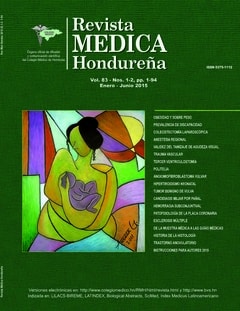Neonatal hyperthyroidism. Presentation of clinical case
Keywords:
Neonatal Hyperthyroidism, Graves` Disease, Pregnancy, Thyroid-Stimulating Immunoglobulin (TSI)Abstract
Thyrotoxicosis is the term used to refer to the excess of thyroid hormones. Neonatal Hyperthyroidism caused by Graves’ Disease is a pathological condition with a very low incidence, only 5% of the thyrotoxicosis cases occur in childhood, and Neonatal Hyperthyroidism occurs in less than 1% of cases in this group of age. During pregnancy, the TSI (Thyroid-Stimulating Immunoglobulins) produced by the mother pass through the placenta to the fetus, they stimulate the TSH receptors in the fetal thyroid causing overproduction of thyroid hormones. High levels of T3, T4, TSI and low levels of plasmatic TSH indicate Neonatal Hyperthyroidism in the neonate. We present the case of a patient with maternal history of hyperthyroidism (Graves’ Disease) with inadequate treatment. The neonate presents the following clinical manifestations: exophthalmos, goiter, low birth weight and irritability. Thyroid function tests revealed elevated levels of T3, T4, and a decreased TSH. Most cases of Neonatal Hyperthyroidism have maternal history of Graves´ Disease and suggest TSI transfer to the fetus. The postnatal clinical manifestations evidenced in the patient are in accordance with what is said in medical literature. These clinical manifestations plus the maternal background lead towards the diagnosis. Confirmation of the diagnosis is achieved through the evaluation of thyroid function tests. Early diagnosis and prompt treatment are required to prevent complications, including death.
Downloads
499




